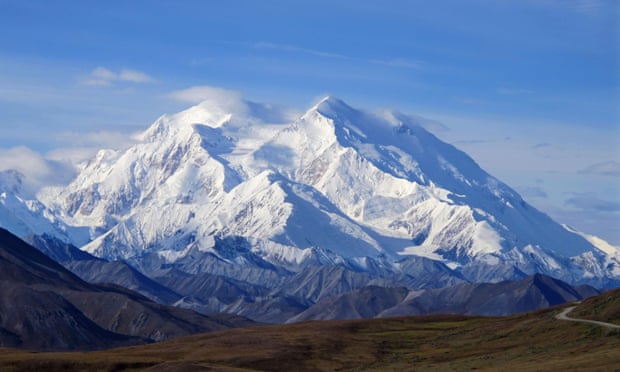By The Guardian
Barack Obama will use a trek across Alaska’s melting glaciers and permafrost to showcase the fight against climate change during a three-day visit to the state starting on Monday.
But the president, who departed for Anchorage in Air Force One on Monday morning, was accused of damaging his own environmental legacy – and the effort to keep warming below the internationally agreed goal of 2 degrees celsius – by allowing Shell to hunt for oil in Arctic waters.
“Indigenous peoples of Alaska have seen alarming impacts from climate change already, and Shell’s drilling will only make them worse,” Faith Gemmill of RedOil, said in a statement, ahead of demonstrations against Shell drilling in Anchorage.
Coastal erosion and rising rates of wildfire were threatening native communities across the state, she said. “We are in climate crisis here, and advancing energy extraction within our ancestral territories would seriously exacerbate climate change and threaten our ability to survive in the Arctic.”
The visit to Alaska is the most ambitious by any sitting US president – a scale underlined by Obama’s decision to rename the continent’s tallest peak Mount Denali, which means Great One in the native Athabaskan language.
Obama’s journey across Alaska will see him hone his wilderness skills with former special forces survival expert Bear Grylls for the NBC show Running Wild with Bear Grylls and visit a melting glacier, a famed salmon run, and a community losing ground to thawing permafrost and coastal erosion, and will showcase the real-time effects of climate change in the polar regions.
However, the president ran into further criticism from native Alaskan and environmental campaign groups on Monday for allowing Shell to drill for oil in the Chukchi Sea, only weeks after signing off on his ambitious plan to cut carbon polluion from power plants.
“No president has done or said more about the threat of climate change than Barack Obama,” Gene Karpinski, the president of the League of Conservation Voters, said in a statement. “That is why we remain deeply disappointed that Shell has been allowed to begin drilling in the Arctic Ocean this year.”
Obama, in his weekly address on Saturday, insisted there was no clash between his efforts to move the economy to clean energy and his decision to allow Arcticdrilling.
“Even as we accelerate this transition, our economy still has to rely on oil and gas,” he said in the address. “As long as that’s the case, I believe we should rely more on domestic production than on foreign imports.”
He acknowledged public concerns about Shell drilling in the Arctic, and the risks of a repeat of the BP oil disaster.
“We don’t rubber-stamp permits. We made it clear that Shell has to meet our high standards in how they conduct their operations – and it’s a testament to how rigorous we’ve applied those standards that Shell has delayed and limited its exploration off Alaska while trying to meet them,” he said.
Obama has also taken some criticism from Republicans from changing the name of the continent’s highest peak from McKinley to Denali. John Boehner, the house speaker and an Ohioan like the late Republican president William McKinley, said he was “deeply disappointed” in the decision.
Obama’s arrival in Anchorage on Monday coincides with the start in Bonn of the last set of formal negotiations ahead of a critical meeting in Paris at the end of the year intended to reach a global deal to fight climate change.
The pace of those negotiations has been painfully slow. Obama, who will start his swing through Alaska by dropping in on a meeting of foreign ministers of eight Arctic countries taking place in Anchorage, hopes to inject some much-needed urgency into those talks.
“This is a buildup to the Paris negotiations,” a State Department official told a conference call with reporters. “It’s sort of two purposes: to raise awareness of the American Arctic but also to show that the global issue of climate change is impacting the US.”
It is hoped the Arctic meeting could also smooth over emerging tensions between the US, Russia, Canada and the other countries about competition over shipping lanes, oil and other natural resources as the ice retreats at the top of the world.
The Arctic is warming twice as fast as the rest of the world. “Alaskans are already living with its effects,” Obama said in his radio and video address on Saturday. “More frequent and extensive wildfires. Bigger storm surges as sea ice melts faster. Some of the swiftest shoreline erosion in the world – in some places, more than three feet a year.”
“This is all real,” he went on. “This is happening to our fellow Americans right now.”
The White House said Obama would use the visit to draw public attention to those consequences and the risks to Alaska’s tiny coastal communities, some of which could be forced to relocate because of climate change. A number have already chosen to move but have no funds to do so.
But campaign groups said Obama was sabotaging his own mission by giving the go-ahead to Shell to hunt for oil.
“There is a very obvious contradiction between meaningful action to address climate change and continued exploration for remote and difficult hydrocarbon resources,” said Michael LeVine, Arctic campaigner for Oceana.
“Moving forward with exploiting Arctic oil and gas is inconsistent with the administration’s stated goal and meaningful action on climate change.”
Credo, another campaign group, accused Obama of “self-defeating hypocrisy”.
After his meeting at the Arctic conference, Obama will hike across a melting glacier in the Kenai Fjords National park and visit the rural community of Dillingham, close to Bristol Bay, site of the world’s biggest natural salmon run. The president will also visit the town of Kotzebue, which is increasingly battered by Arctic storms because of coastal erosion and the retreat of sea ice cover.

No hay comentarios:
Publicar un comentario